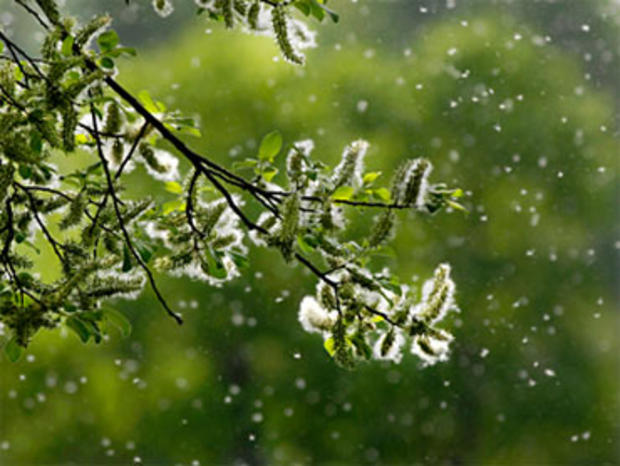How to survive the seasonal allergy explosion
The buds on the trees and green grass sprouting on the ground are a welcome sight after a long and harsh winter. But for allergy sufferers this means months of impending misery: stuffed and inflamed sinuses, scratchy throats, itchy and watery eyes and a lot of sneezing.
Unfortunately, experts say people with seasonal allergies are in for an especially rough ride this spring and summer. The long winter's excessive snowfall and precipitation followed by warmer temperatures means more moisture in the air. All of this raises mold and pollen counts to epic proportions.
"There is a pollen burst going on right now," Dr. Clifford Bassett, the medical director at Allergy and Asthma Care of New York, told CBS News. "They're primed and they're ready to go and they're already releasing their pollens earlier."
High pollen count in cities is driven by air pollution, warmer temperatures and also changes in trends of plant growth. According to Bassett, there currently are more male plants than female plants in urban areas; male plants are responsible for the pollen that gets into the air.
Last month, the Asthma and Allergy Foundation of America released their 12th annual "Spring Allergy Capitals" for the 45 million sneezy Americans. The report ranks the 100 cities in the U.S. with the worst allergies. This year, Louisville, Ky., climbed to the first spot from last year's fifth. The full rankings of 100 cities can be accessed on the AAFA's website.
How to cope with spring allergies
So what can you do? Here are some tips from Bassett and other experts for how to make allergy season less unbearable so you can spend at least part of your spring in the great outdoors:
-Visit an allergy specialist. Get tested to find out specifically which allergies you have. Even though pollen and mold both cause sneezing and watery itchy eyes some medications may be more effective than others.-Track pollen and mold counts. Once you know your allergen, you can create an allergy calendar to identify when levels of pollen are highest. There are a number of phone apps, such as Pollen.com's Allergy Alert to help allergy sufferers track pollen and mold levels along with the weather.
-Pre-treat your symptoms. It's best to start taking medication before your allergies kick in, which will help to lessen your symptoms. Bassett recommends you begin medications two weeks before you actually start feeling stuffy.
-Keep your hair clean. On days with high humidity, your hair is the perfect place for pollen to hide. At the end of the day give your hair a good scrub to prevent a nighttime sneeze-fest. In addition, wash your comb and brush frequently, and skip the hair gel and other sticky styling products which pollen tends to cling to.
-Protect your eyes. During the daytime, shield your eyes from airborne debris with sunglasses.
-Consider alternative treatment. Some sufferers swear by acupuncture but it may best to try more mainstream options before giving complementary treatment a shot. And it's always best to check with your allergy specialist or primary care doctor.
